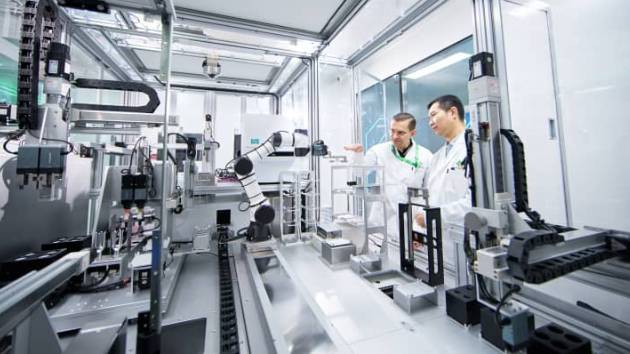A groundbreaking development has taken place in the pharmaceutical industry as the first-ever drug created entirely through artificial intelligence (AI) has entered human clinical trials. Insilico Medicine, a biotech startup based in Hong Kong, secured over $400 million in funding to develop the drug, named INS018_055. Its primary purpose is to treat idiopathic pulmonary fibrosis (IPF), a chronic lung disease characterized by scarring. This condition has been increasingly prevalent in recent decades and currently affects approximately 100,000 individuals in the United States, potentially leading to death within two to five years if not treated, in accordance with the National Institutes of Health.
Insilico Medicine's CEO and founder, Alex Zhavoronkov, revealed that their AI-designed drug is the first of its kind to progress to Phase II clinical trials with human patients. While other AI-designed drugs are also undergoing trials, INS018_055 stands out for being the first drug with both a novel AI-discovered target and a novel AI-generated design. The journey to develop this groundbreaking drug began in 2020, with the ambitious goal of creating a transformative medicine to address the limitations of current IPF treatments, which primarily focus on slowing disease progression but often come with unpleasant side effects.
Insilico Medicine's decision to prioritize IPF stems from the condition's association with aging. However, the company has also made significant progress in AI-generated drugs for other critical areas. One such drug is aimed at combating COVID-19 and is currently in phase one clinical trials. Additionally, they have received FDA approval to initiate clinical trials for a cancer drug known as a "USP1 inhibitor," specifically designed to treat solid tumors.
Alex Zhavoronkov reflected on the company's journey, acknowledging that when they initially launched, their focus was on developing algorithms that could facilitate the discovery and design of new molecules. He admitted that back then, he could not have imagined taking AI-designed drugs into clinical trials with actual patients. However, the realization dawned on them that in order to validate the effectiveness of their AI platform, they needed to develop a new drug, target, and conduct clinical trials to prove the technology's capabilities.
The ongoing study of the IPF drug involves a randomized, double-blind, placebo-controlled trial spanning 12 weeks in China. Insilico Medicine has plans to expand the testing to include 60 subjects across 40 sites in the United States and China. Success in the current phase two study would pave the way for further investigations involving a larger participant cohort, potentially leading to phase three studies with hundreds of individuals.
Zhavoronkov cautiously expressed expectations for the release of Phase II trial results next year. He emphasized the challenges in predicting exact timelines for future phases, particularly due to the relative rarity of the disease and the specific criteria patients must meet for inclusion in the trials. Nevertheless, he conveyed optimism, asserting that the drug could be ready for the market in the next few years, bringing hope to patients who may benefit from this remarkable AI-generated treatment. The potential impact of AI in revolutionizing drug discovery and development is becoming increasingly tangible, marking a significant milestone in medical history.




No comments yet
Be the first to share your thoughts!